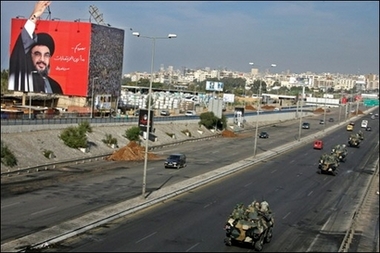 BEIRUT (AFP) JAN 24 – Calm returned to Lebanon as roads were cleared and Beirut airport reopened after the opposition called off a general strike that sparked deadly street fights ahead of a donor conference in Paris. Traffic moved freely Wednesday after tractors and cleaners worked all night to clear tyres, sand and rubble from streets blocked in an opposition show of force on Tuesday aimed at ousting the Western-backed government.
BEIRUT (AFP) JAN 24 – Calm returned to Lebanon as roads were cleared and Beirut airport reopened after the opposition called off a general strike that sparked deadly street fights ahead of a donor conference in Paris. Traffic moved freely Wednesday after tractors and cleaners worked all night to clear tyres, sand and rubble from streets blocked in an opposition show of force on Tuesday aimed at ousting the Western-backed government.
Many shops also reopened, although some waited until noon to ensure the situation had returned to normal. The state-run Lebanese University and many schools across the country stayed shut.Tuesday’s strike turned violent as opposition militants burned tyres, blocked roads and fought street battles with pro-government supporters that left three people dead and 133 others wounded.The violent protests paralysed Lebanon for a day and added to concerns over the stability of a country still bearing the scars of the 1975-1990 civil war and last summer’s massive Israeli war against the Shiite Muslim Hezbollah.
"The catastrophe has descended, and all have lost," said the liberal Al-Anwar daily, which said the opposition had gone too far and the government could no longer ignore their demands.
"Lebanon contains discord… and its past wars filled the streets," said the leftist As-Safir, which said the violence raised the spectre of civil war battles between militias divided along confessional lines.
Prime Minister Fuad Siniora took an early flight from Beirut to Paris for Thursday’s aid conference for Lebanon which is still reeling from the economic impact of last summer’s war and a public debt of 41 billion dollars.
He flew from the country’s only international airport which resumed normal operations after its near-total disruption on Tuesday by protesters who blocked access and forced the cancellation of 34 flights.
Late on Tuesday, the pro-Syrian opposition said it "decided to suspend the strike which served as a warning to the illegitimate government." But it also warned of "more effective" measures if the cabinet continued to reject opposition demands.
The anti-Syrian camp warned of counter-protests if the opposition resumed its forced closure of the country.
Siniora said that government forces will not accept attempts to disrupt public order, and blamed Iran and Syria for the nationwide strike led by Hezbollah and backed by two regional allies.
Lebanon has "been paying the price of imposed decisions coming from outside countries, like Iran and Syria", Siniora told Japan’s Kyodo News.
His government and the parliament have effectively been paralysed since six pro-Syrian ministers, including two from Hezbollah, resigned last November.
Lebanese officials, including Siniora, called the street protests a coup bid and an attempt to return to Damascus’s "tutelage" — the 29-year Syrian military domination of Lebanon that ended in 2005.
Hezbollah MP Hassan Fadlallah told AFP on Wednesday that "the chance for political resolution is still open… but if the government continues to ignore people’s demands, it will bear the responsibility of pushing them to express their opinions by the means they see fit."
The opposition wants to replace Siniora’s government, which took office after elections following the withdrawal of Syrian troops, with a national unity cabinet in which it has a veto.
In Paris, more than 30 donor countries and many international institutions are due to attend the aid conference expected to secure several billion dollars in long-term financing for Lebanon’s ailing economy.
The European Commission said on Wednesday it will pledge some 400 million euros (520 million dollars). On top of money already pledged, the new funding will bring to 500 million euros the Commission’s reconstruction money for the country up to 2010.
Hosted by French President Jacques Chirac, the conference will include prominent personalities such as new UN chief Ban Ki-moon, US Secretary of State Condoleezza Rice, EU foreign policy chief Javier Solana and World Bank president Paul Wolfowitz.
Siniora accused the opposition of "resorting to blackmail" to sabotage the conference "at a time we most need it and which will be a one-time chance for Lebanon."



